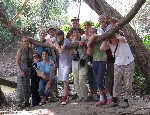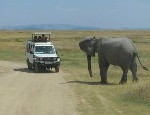News & Events
Professor Emeritus Leads Group to Tanzania
Posted on Wednesday, July 30, 2008
Dr. Clarence Harms, Westminster College professor of biology emeritus and director of the Field Station, hosted a group of ecotourists to Tanzania in June.
Harms, a seasoned traveler, has led groups of former students to World Heritage Sites including the Galápagos Islands of South America, and the Serengeti and Ngorongoro Crater in Africa.
"Our intent is to tread lightly in ecologically sensitive places and come home changed for the better," Harms said.
Included in this year's trip were 1973 Westminster alumna Christine Chandler Wilder and her husband Robert, who traveled with Harms to the Caribbean as students in 1971, and with their three daughters to the rainforest of Ecuador and the Galápagos in 1999. The Wilders joined a group of ecotourists on a sunrise hot air balloon trip that drifted 20 miles across the Serengeti.
Jennifer Anderson Brackbill, a 1996 Westminster graduate who was part of Harms' group to Ecuador in 1995, traveled to Africa with her son Isaac. With help from her fellow travelers, she compiled a species list that included the Big Five (lion, leopard, elephant, buffalo, and rhino), as well as the bush baby; serval cat; dikdik; topi; Grant's and Thomson's gazelles; Masaai giraffe; agama and rock monitor lizards; chameleon; Nile crocodile; walking stick; giant slug; and the unique plants that provide the familiar spices of vanilla and cloves.
Catherine Heidrich, a 2003 Westminster alumna, captured a pair of black rhinoceros and close-ups of lions and cheetahs with the telephoto lens of her camera. She even photographed the "tonsils" of a bull elephant that trumpeted and seemed ready to charge-or at least challenge-the 4 x 4 Land Rover with an open top.
Visits to two villages of the Masaai Tribe acquainted the group with the intrigue, complexity, and paradoxes of culture: inside a mud hut that is traditionally covered with cow dung, the man of the house answered his cell phone. Masaai maidens giggled as they compared jewelry with the women of the group.
Olduvai Gorge, a World Heritage Site, attracted worldwide attention in the 1950s when Louis and Mary Leakey discovered the remains of human ancestors that pushed the story of human evolution back three million years. A museum on this site now documents the significance of East Africa to anthropology.
The historic island of Zanzibar was the final stop on the 17-day ecotour. In addition to white sand beaches on the Indian Ocean and reefs alive with colorful fish, the island illustrates the impact of history that dates back to the Arabian nights and the slave trade throughout Africa.
"Near the historic slave market, an Anglican church and a Sunni mosque help assuage feelings of the terrible things humans are capable of doing to their own kind," Harms said.
A spice tour ended with a sampling of the spices and fruits unique to worldwide tropics.
The Jozani Forest of Zanzibar is home to the rare and endangered red Colobus monkey, whose numbers are declining on Africa's mainland due to habitat loss and degradation. In the Jozani, the numbers are actually increasing as evidence of good conservation measures.
Contact Harms at (724) 946-8520 or e-mail harmsc@westminster.edu for more information.


More Stories



